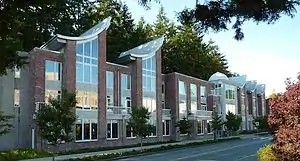Institute of Asian Research
The Institute of Asian Research (IAR) at the University of British Columbia is a research institute founded in 1978 and has been the foremost research centre in Canada for the inter-disciplinary study of Asia. With a broad geographic reach extending to China, India and South Asia, Japan, Korea and Southeast Asia, the institute conducts research and teaching in policy-relevant issues informed by language and area studies.
| Formation | 1978 |
|---|---|
| Purpose | inter-disciplinary study of Asia |
| Headquarters | University of British Columbia |
The institute's Master of Public Policy and Global Affair] program is a professional global public policy program with particular expertise in Asia Pacific and sustainability policies. The program provides policy makers and future leaders with multidisciplinary policy analysis and design skills and subject-specific expertise in development, sustainability, and global governance.
Institute of Asian Research Faculty
- Timothy Brook, Republic of China, chair in Chinese Research
- Timothy Cheek, Louis Cha Chair in Chinese Research
- Cesi Cruz, assistant professor, Institute of Asian Research and department of political science
- Julian Dierkes, assistant professor and Keidanren Chair in Japanese Research
- Paul M. Evans, director of the Institute of Asian Research
- Hyung Gu Lynn, AECL/KEPCO Chair in Korean Research
- Jessica Main, Tung Lin Kok Yuen Canada Foundation Chair in Buddhism and Contemporary Society
- Kai Ostwald, assistant professor, Institute of Asian Research and department of political science
- Kyung-Ae Park, Korea Foundation Chair in Korean Research
- Pitman B. Potter, Hong Kong Bank Chair in Asian Research
- Tsering Shakya, CRC Chair in Religion and Contemporary Society of Asia
- Sara Shneiderman, assistant professor, Institute of Asian Research and department of anthropology
- Yves Tiberghien, associate professor, Department of Political Science; Senior Fellow, Global Summitry Project, Munk School of Global Affairs; Senior Fellow, Asia-Pacific Foundation of Canada (APFC); co-director, UBC China Council
- Ilan Vertinsky, Vinod Sood Professor, International Business Studies, Sauder School of Business, professor of Strategy and Business Economics, professor, Institute of Asian Research and Sauder School of Business
Master of Public Policy and Global Affairs Program
UBC's Master of Public Policy and Global Affairs is a graduate program that provides a path for management roles in international institutions, companies, non-governmental organizations and various levels of government in all parts of the world.
C. K. Choi Building

.jpg.webp)
The institute is housed in the purpose-built C. K. Choi Building in the northwest quadrant of the UBC campus. Designed by Matsuzaki Wright Architects of Vancouver, B.C., and completed in 1995, the building has been recognized for its sustainable design.[1][2] It is the University of British Columbia's "flagship environmental building"[3] in what is calls its ‘living laboratory’, the campus used to showcase "innovative approaches to conserving energy, water and materials, while striving to make positive impacts on the environment."[4][5]
The building is named after Dr. Cheung-Kok Choi, a businessman and philanthropist in China, Hong Kong and Canada, and a major donor to UBC.[6][7] The building houses the institute's five research centres which focus on China, Japan, Korea, Southeast Asia, and India and South Asia. The "daringly innovative architecture"[8] integrates cultural expression, interior and exterior architectural presence, together with environmental features and functions. The five identical curved roof forms reflect the institute's Asian focus, providing an identifiable focus for each research centre without giving predominance to one culture or centre over another, and provide natural light and natural ventilation to interior spaces.[9]
References
- UBC press release 1996-10-06 Archived 2011-04-04 at the Wayback Machine
- Cascadia Building Council
- Cole and Steiger, p.7
- UBC Sustainability Archived 2010-11-14 at the Wayback Machine
- The Canadian Encyclopedia
- IAR In Memoriam Archived 2015-09-14 at the Wayback Machine
- "Community Leaders". Archived from the original on 2012-03-07. Retrieved 2010-10-30.
- IAR History Archived 2011-10-02 at the Wayback Machine
- CascadiaBC Archived 2011-01-06 at the Wayback Machine